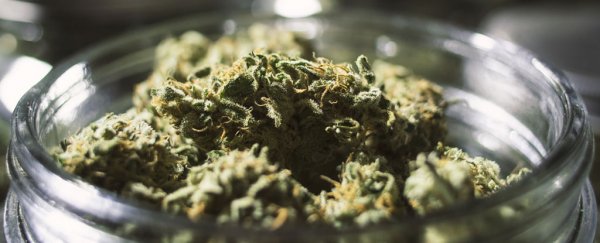The US Drug Enforcement Agency (DEA) decided to reject a petition that asked them to reclassify marijuana, leaving it in the Schedule 1 (most restricted) category of controlled substances with "no currently accepted medical use", as NPR and other outlets reported Wednesday.
But one aspect of the decision could actually open the door for medical marijuana in the future.
Today, researchers can only study the limited quantity of marijuana grown at the University of Mississippi, which has a contract with the National Institute on Drug Abuse.
But in the DEA's August 11 announcement, the agency said that it will finally allow other institutions around the country to obtain licences to grow marijuana for research.
In many ways, this change is simply a practical approach for the present time, since 25 states have legalised medical marijuana in some form and several others have legalised recreational use.
Yet it clears a significant roadblock standing in the way of researchers eager to conduct rigorous tests to demonstrate marijuana's potential uses and build evidence that its Schedule 1 classification is unwarranted.
A new approach is needed
Despite state legalisation efforts, it's been close to impossible to conduct official research on marijuana, something researchers have long lamented.
"There is a desperate need for this research, but it's impossible to study this drug properly in an atmosphere of prohibition," Sue Sisley, a psychiatrist who has studied post-traumatic stress disorder for the Department of Veterans Affairs and the University of Arizona College of Medicine, told The Washington Post.
It's been so hard because it's tricky to gain access to that limited, tightly controlled University of Mississippi supply – the country's only legal source.
And that creates something of a Catch-22. Without studying pot, it's impossible to demonstrate that marijuana has any "accepted medical use", even though most researchers think that certain compounds in marijuana might help with certain health conditions.
"We clearly do not have that much research about marijuana and you need to know what chemical is carrying out its effects," Yasmin Hurd, a professor of neuroscience and psychiatry at Icahn School of Medicine at Mount Sinai, told me in an interview last fall.
"Like many plants, marijuana has many different chemicals," she said. More than 400, by many measures. "There are specific components of the plant that can be developed for medical interventions."
But if we don't know which specific chemical of hundreds or more in the plant is carrying out the helpful effects, we don't know what it is that's helping people – which is what you need to demonstrate a medical use.
Hurd says using all the compounds in marijuana simultaneously is like "throwing 400 tablets in a cocktail and saying 'take this'".
Toward approved medical use in the future
This policy change could help researchers identify useful medical compounds, which could lead to either the development of specific marijuana strains that have high levels of those compounds or – perhaps more likely – to drugs derived from marijuana.
And if that happens and the Food and Drug Administration approves a product, the DEA can and may reschedule cannabis.
That would finally remove marijuana from the category of substances like LSD and heroin and place it in the categories of substances that are regulated but accepted as "medically useful", like Xanax or a wide variety of painkillers.
The DEA says that they aren't opposed to letting people research marijuana in the first place.
"Notably, DEA has approved every application for registration submitted by researchers seeking to use NIDA-supplied marijuana to conduct research that HHS determined to be scientifically meritorious," the agency notes in a press release.
But previous rules have severely limited the research that's possible. This policy change could open things up, potentially leading to federally-approved medical marijuana down the line.
This article was originally published by Business Insider.
More from Business Insider:
